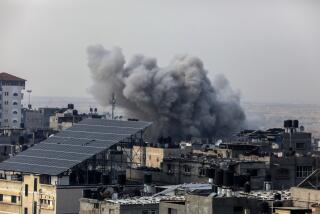Beyond the Atrocities, There’s Reason to Hope
In recent days, sickening reports of brutal massacres have emerged from Algeria. Knowledgeable observers have discounted official statements attributing responsibility to the illegal Islamist opposition known as FIS (Islamic Salvation Front) in light of the government’s own record of indiscriminate killing.
What accounts for the exceptional cruelty of the fighting? Who are its authors, what do they want and what--if anything--can the United States contribute to its resolution?
In January 1992, parliamentary elections in newly democratic Algeria were canceled when the military prevented FIS, then a legal political party, from taking its seats. Ultimately, the president resigned, the constitution was suspended, FIS was banned, tens of thousands of people were arrested and civil war broke out.
Today, nearly six years later, more than 60,000 Algerians have perished and the violence shows little sign of abating.
Ordinarily, such an affront to democracy would evoke American condemnation, but the United States has been notably silent. In failing to forcefully repudiate the coup and move to end the conflict, the U.S. displayed both a disheartening lack of political courage and a dismaying failure of analytical discernment.
The many members of the Algerian ruling elite who were determined to retain power faced an opposition that was as feared in Paris and Washington as at home. They lobbied hard to persuade the Western powers that FIS participated in electoral politics in bad faith, lending the military’s refusal of the fruits of victory a veneer of legitimacy.
In fact, neither the sources nor the solution to Algeria’s dilemma have much to do with Islam. The brutal tactics utilized by the Algerian regime and its opponents are the legacy of the singularly brutal war of independence from the French. Many of the techniques of modern torture and terrorism were perfected in the crucible of the Algerian revolution. The 30 years of stability after the French withdrew in 1962 did not heal all the wounds; as civil order began to disintegrate in the aftermath of the coup, many old scores reappeared, ripe for settling.
The political turmoil reflects not religious conviction but political uncertainty. Although Algeria experienced stability under an army-backed single party, the FLN (National Liberation Front), after independence, by the late 1980s popular dismay with government mismanagement of the economy sparked widespread riots. Faced with a choice between repression or reform, the rulers gambled, choosing liberalization and distancing themselves from the hard-liners in their own party to forge a tacit alliance with moderates in the opposition. By expanding political participation and creating democratic political institutions, the president and his advisors hoped to make themselves indispensable in a democratization process that would be too powerful to be stopped.
It was a clever strategy but risky, too dependent on flawed institutional designs and uncontrollable international events; ultimately it backfired. In attempting to pressure their own moderate leadership, radicals within FIS provoked the hard-line authoritarians in the government. Opponents of democracy on both sides contributed to the demise of Algeria’s democratic experiment.
With the intervention of the army, the ruling FLN split and the liberals in the government went into opposition. So too the FIS, which was soon banned, splintered into several armed groups in addition to its fragile civilian wing. As the conflict dragged on, both FIS and the government lost control of much of their constituencies as freelance thugs used the cover of the conflict to pursue private agendas and old vendettas.
If the United States is to contribute to ending the conflict in Algeria, we must acknowledge that there are profoundly antidemocratic forces in the Algerian government as well as in the Islamist movement and that there are dedicated democrats in both camps. Today, there are signs that the moderates on both sides are moving toward dialogue, even in the face of opposition from their erstwhile ideological allies.
The government release of a long-jailed FIS leader in June and the Islamists’ call for a cease-fire last week mark important steps in a process of reconciliation.
The recent upsurge in murders so vicious as to guarantee international media attention is part of efforts to derail such a process by hard-liners on both sides. We must not be so concerned to assign responsibility for the murders or so appalled by their brutality that we lose sight of the need to identify the proponents of peace and to support a vision of a democratic Algeria that is principled, practicable and infinitely preferable to today’s atrocities.
More to Read
Sign up for Essential California
The most important California stories and recommendations in your inbox every morning.
You may occasionally receive promotional content from the Los Angeles Times.










